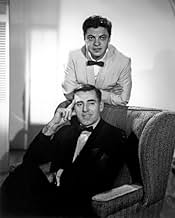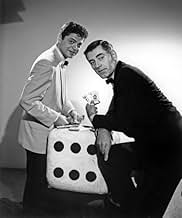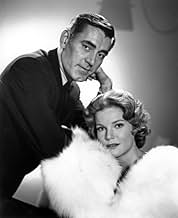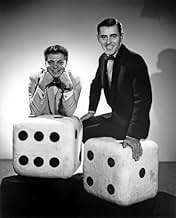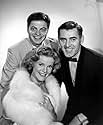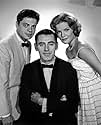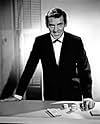Añade un argumento en tu idiomaA large ship sailing in international waters allowed patrons to gamble the night away. Mr. Lucky was the owner, and with his assistant Andamo, handled problem patrons, crooks, and cops to st... Leer todoA large ship sailing in international waters allowed patrons to gamble the night away. Mr. Lucky was the owner, and with his assistant Andamo, handled problem patrons, crooks, and cops to stay afloat.A large ship sailing in international waters allowed patrons to gamble the night away. Mr. Lucky was the owner, and with his assistant Andamo, handled problem patrons, crooks, and cops to stay afloat.
- Premios
- 1 nominación en total
Explorar episodios
Reseñas destacadas
TV actors, at least in the old days when they were placed in a separate class from movie actors, often seemed to be clones of their movie brethren. Some were singular in their associations. Nehemiah Persoff seemed to be the Edward G. Robinson of television, getting similar roles and acting them in a very similar manner. Carolyn Jones was the Bette Davis of TV, even to the point of playing a set of sisters one of whom is a murderer on Burke's Law. Other's had company in their pursuits. The western stars were all either John Wayne or Gary Cooper, with an occasional Jimmy Stewart or Henry Fonda thrown in, (including the real thing on "The Deputy"). There were a whole selection of Clark Gables, including John Russell, Rory Calhoun, Richard Egan , Robert Lowery and others. There were plenty of Brandos, including Burt Reynolds, George Maharis and John Saxon. There were enough Rock Hudsons to fill a theater, with John Gavin, Tom Tryon and Gardner McKay coming immediately to mind. The blonde versions I call the "Redfords", a group of thoughtful , well educated types of which Robert Redford was one along with James Franciscus, Richard Chamberlain and William Shatner. They had varying degrees of success with Redford emerging as the head of the class.
Perhaps the most successful strain, however were the Cary Grants. Grant made an ideal model for the suave detective hero, able to be charming or tough as the occasion demanded. Craig Stevens was hired to play Peter Gunn specifically because of a strong resemblance to Grant. His tightlipped performance was not really very charming but it's surely how Cary would have played that character. Latern-jawed John Vivyan played a role that Grant had actually essayed in the movies, Mr. Lucky. He was competent at best. The heroes of the Warner Brother's detective shows were largely based on Cary Grant. Ephram Zimbelist Jr.'s Stu Bailey was a grant-style role with a lot more charm than Peter Gunn. Richard Long's Rex Randolph on Bourbon Street Beat was much the same. Anthony Eisley's Tracy Steele was a less convincing version of the same character on Hawaiian Eye.
But the best of the Grant clones was Gene Barry. He was male-model handsome, had good breeding and seductive whiskey voice. He was also TV's greatest reactors. He had a series of comic takes that was perfect for Amos Burke, who had to confront an unending series of eccentric subjects. Yet he could turn around and romance the ladies or get tough with the tough guys. And he was a good enough actor to hold up his end when the heavy dramatics intervened.
One wonders what the originals of these clones must have thought as they watched the boob tube in it's infancy.
Perhaps the most successful strain, however were the Cary Grants. Grant made an ideal model for the suave detective hero, able to be charming or tough as the occasion demanded. Craig Stevens was hired to play Peter Gunn specifically because of a strong resemblance to Grant. His tightlipped performance was not really very charming but it's surely how Cary would have played that character. Latern-jawed John Vivyan played a role that Grant had actually essayed in the movies, Mr. Lucky. He was competent at best. The heroes of the Warner Brother's detective shows were largely based on Cary Grant. Ephram Zimbelist Jr.'s Stu Bailey was a grant-style role with a lot more charm than Peter Gunn. Richard Long's Rex Randolph on Bourbon Street Beat was much the same. Anthony Eisley's Tracy Steele was a less convincing version of the same character on Hawaiian Eye.
But the best of the Grant clones was Gene Barry. He was male-model handsome, had good breeding and seductive whiskey voice. He was also TV's greatest reactors. He had a series of comic takes that was perfect for Amos Burke, who had to confront an unending series of eccentric subjects. Yet he could turn around and romance the ladies or get tough with the tough guys. And he was a good enough actor to hold up his end when the heavy dramatics intervened.
One wonders what the originals of these clones must have thought as they watched the boob tube in it's infancy.
Some of us who enjoy this show in general and Ross Martin's work on it in particular, have been discussing it episode-by-episode at www.andamoinmrlucky.proboards.com.
Here's an example, from one of my own posts, which provoked argument from another member:
"Anyway, back to 'The Money Game': Notice the difference between how natural Rovacs sounds when he says, "The bird from Wilbur College?" and how unnatural Lucky sounds when he says, "The bird who said this country has no respect for mathematicians . . . ." I think the writer missed it with that line. Lucky just can't use slang terms like "bird." And the writer did it again, though not so blatantly, with Lucky's dialogue with Eddie about the "fish." Lucky has too much respect for his customers to refer to them with derogatory words like that. Poor John Vivyan-- what he must have thought when he saw this week's script. In addition to having to speak out of character, he sure got stuck with some lame lines this time."
In retrospect, I'm not sure I agree with myself there about the fish. We'd sure welcome other voices, other opinions, from people who'd like to watch and seriously discuss the show with us.
Here's an example, from one of my own posts, which provoked argument from another member:
"Anyway, back to 'The Money Game': Notice the difference between how natural Rovacs sounds when he says, "The bird from Wilbur College?" and how unnatural Lucky sounds when he says, "The bird who said this country has no respect for mathematicians . . . ." I think the writer missed it with that line. Lucky just can't use slang terms like "bird." And the writer did it again, though not so blatantly, with Lucky's dialogue with Eddie about the "fish." Lucky has too much respect for his customers to refer to them with derogatory words like that. Poor John Vivyan-- what he must have thought when he saw this week's script. In addition to having to speak out of character, he sure got stuck with some lame lines this time."
In retrospect, I'm not sure I agree with myself there about the fish. We'd sure welcome other voices, other opinions, from people who'd like to watch and seriously discuss the show with us.
This TV series, very loosely based on the movie by the same title, is about a suave gambler, Mr. Lucky (John Vivyan), his faithful sidekick, Andamo (Ross Martin), and various guest stars (such as Frank Gorshin) who undergo their adventures on Lucky's yacht, the Fortuna II (Fortuna I sank in episode 1). Anchored beyond L.A.'s twelve-mile limit, the yacht is a center of gambling, classy dining, and intrigue. Lucky and Andamo get themselves into all kinds of danger, but always manage to get themselves out by the time the closing credits roll. While the setting is creative, the magic of this series is created by Hank Mancini's fabulous musical score. The theme "Mr. Lucky" plays throughout, as does Mancini's "Chime Time" and other lovely numbers (e.g., "Blue Satin").
Sadly, this series lasted just one season. Even sadder is the fact that these few episodes have not been reissued in DVD. Just a handful have been released in VHS mode. Maybe this will change. I certainly hope so.
Sadly, this series lasted just one season. Even sadder is the fact that these few episodes have not been reissued in DVD. Just a handful have been released in VHS mode. Maybe this will change. I certainly hope so.
During the summer of 2004 we happened upon the derelict, rusting hulk of the Fortuna moored to a dock in Eureka, California. The harbor master pointed it out to us as what was left of the yacht used on the TV series.
Lord only knows what the poor thing had gone through after being decommissioned by Hollywood. The harbor master intimated it might have been used as a drug running boat to and from Mexico.
In any event, a peek through its windows from dockside revealed it is now being used as a storage facility for various boat machinery and parts.
Lord only knows what the poor thing had gone through after being decommissioned by Hollywood. The harbor master intimated it might have been used as a drug running boat to and from Mexico.
In any event, a peek through its windows from dockside revealed it is now being used as a storage facility for various boat machinery and parts.
"Mr. Lucky" was a half-hour television series attempting to cash in on "Peter Gunn"'s success. Based on an old '40's feature film that had starred Cary Grant, the t.v. "Mr. Lucky" starred John Vivyan as the title character, Ross Martin as his partner Andamo, Pippa Scott as Mr. Lucky's girlfriend, Maggie, and Tom Brown as Lt. Rovaks of the police department, Lucky's sometimes friend, sometimes adversary. Mr. Lucky was the owner of the ship Fortuna, a floating gambling casino moored off of the California coast's 12 mile limit. Each week Lucky and Andamo would become entangled with an assortment of con-men, gamblers, fugitives, even entertainers working for Lucky aboard the gambling casino. Inevitably it would appear that Lucky was either involved in some type of illegal activity or at the least aiding those involved with the activities. This was all done to a modern jazz musical score supplied by "Peter Gunn"'s Henry Mancini.
The series ran one season (during the '59-'60 season) and is probably best remembered for spawning two hit record albums from Henry Mancini, "Theme from Mr. Lucky" and "Mr Lucky Goes Latin".
The series ran one season (during the '59-'60 season) and is probably best remembered for spawning two hit record albums from Henry Mancini, "Theme from Mr. Lucky" and "Mr Lucky Goes Latin".
¿Sabías que...?
- CuriosidadesThe series was cancelled after the sponsors left. CBS was unable to find another sponsor despite the good ratings.
- ConexionesFeatured in La música de John Williams (2024)
Selecciones populares
Inicia sesión para calificar y añadir a tu lista para recibir recomendaciones personalizadas
- How many seasons does Mr. Lucky have?Con tecnología de Alexa
Detalles
- Fecha de lanzamiento
- País de origen
- Idioma
- Títulos en diferentes países
- Bonne chance M. Lucky
- Localizaciones del rodaje
- Empresas productoras
- Ver más compañías en los créditos en IMDbPro
- Duración
- 30min
- Color
- Relación de aspecto
- 1.33 : 1
Contribuir a esta página
Sugerir un cambio o añadir el contenido que falta

